The Gamification in Education Market is estimated to be valued at USD 2959.9 million in 2025 and is projected to reach USD 40805.4 million by 2035, registering a compound annual growth rate (CAGR) of 30.0% over the forecast period.
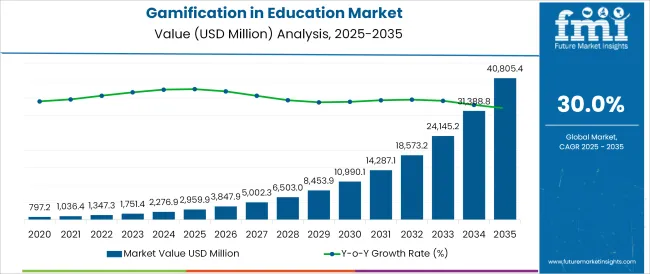
| Attribute | Value |
|---|---|
| Market Size in 2025 | USD 2959.9 million |
| Market Size in 2035 | USD 40805.4 million |
| CAGR (2025 to 2035) | 30.0% |
The gamification in education market is witnessing significant momentum as educational institutions, policymakers, and technology providers embrace engaging, learner-centric pedagogies. Increased emphasis on student engagement, retention, and measurable learning outcomes has fostered widespread interest in gamified solutions, particularly as digital-native learners demand interactive and immersive experiences.
Academic journals and edtech company filings indicate that gamification is being leveraged not only to improve motivation but also to enhance cognitive development and collaborative skills. Rising investments in educational technology infrastructure, government initiatives to modernize classrooms, and growing acceptance of hybrid and digital learning models are shaping the current market landscape.
Future opportunities are expected to emerge through deeper integration of artificial intelligence, adaptive learning algorithms, and mobile-first platforms that tailor content to individual learner profiles. The convergence of evidence-based pedagogy and scalable digital delivery is paving the way for expanded adoption across diverse educational settings.
The market is segmented by Solution and End User and region. By Solution, the market is divided into Gamification Software, Cloud-Based, On-Premises, Services, Professional Services, and Managed Services. In terms of End User, the market is classified into K-12, Corporate Training, and Universities. Regionally, the market is classified into North America, Latin America, Western Europe, Eastern Europe, Balkan & Baltic Countries, Russia & Belarus, Central Asia, East Asia, South Asia & Pacific, and the Middle East & Africa.
When segmented by solution, gamification software is anticipated to capture 37.2% of the total market revenue in 2025, securing its role as the leading solution segment. This leadership has been underpinned by the increasing demand for scalable, customizable, and data-driven platforms that facilitate interactive learning.
As highlighted in edtech industry publications and investor communications, software-based solutions have enabled institutions to deliver real-time feedback, adaptive challenges, and progress tracking while integrating seamlessly with existing learning management systems. The lower marginal cost of deployment and the ability to iterate content without significant hardware investments have made software particularly attractive.
Furthermore, continuous updates incorporating analytics, user-generated content, and AI-powered personalization have enhanced its educational effectiveness and sustained engagement levels. The flexibility, scalability, and ability to align with curriculum standards have collectively positioned gamification software at the forefront of this evolving market.
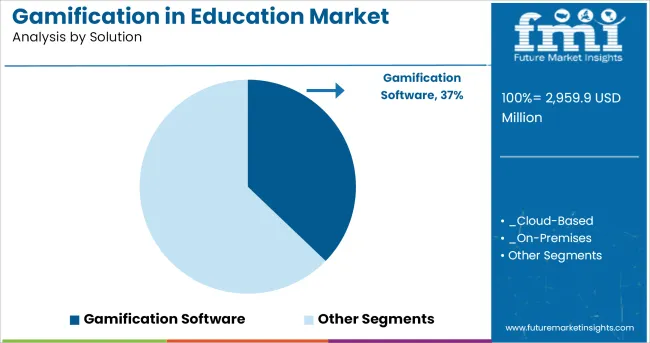
Segmented by end user, the K-12 sector is projected to account for 44.8% of the market revenue in 2025, establishing itself as the dominant end user segment. This prominence has been shaped by growing recognition of the need to foster engagement, motivation, and critical thinking skills in young learners.
Educational policy briefings and school district reports have underscored how gamification aligns with developmental psychology principles, making learning enjoyable and effective for children. Schools have increasingly adopted gamified platforms to supplement traditional teaching with interactive quizzes, leaderboards, and collaborative challenges that encourage participation and reinforce concepts.
Moreover, K-12 institutions have benefited from dedicated funding streams, public-private partnerships, and rising parental demand for innovative educational tools that prepare students for digital futures. The alignment of gamified methods with curricular goals and their capacity to support differentiated instruction have further reinforced the K-12 segment’s leadership in driving the adoption of gamification in education.
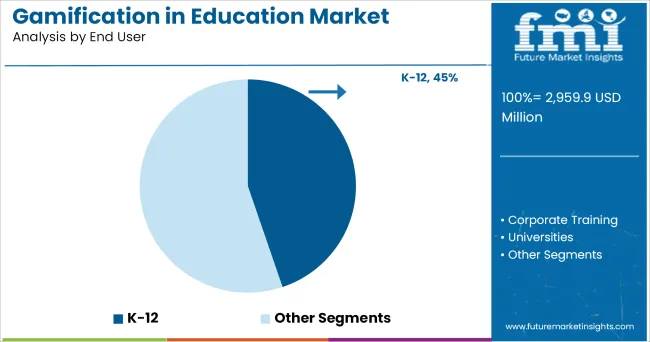
Gamification has been largely used in the education and learning sector for many years. This technology is a developing approach for increasing learners’ motivation and engagement by incorporating game design elements in educational environments.
This technology is becoming increasingly used in educational settings for a number of reasons it ‘makes the hard stuff more fun’, that helps students get motivated and make them more engaged with the subject matter.
Gamification in learning involves using game-based elements such as point scoring, peer competition, team work, score tables to drive engagement, help students adapt new information and test their knowledge. It can apply to school-based subjects, and is also used widely in self-teaching apps and courses, showing that the effects of gamification does not depend on age of students.
Thus, the rise in adoption of Gamification technology in education is drive the market growth.
The education sector has witnessed a drastic change due to new advanced technologies including smartphones and mobile learning applications. The rise in number of mobile learning applications, the growing technological advancements, and the ease of internet access help in providing a personalized learning experience for learners of all types.
Gamification, incorporating gaming elements into non-gaming contexts, is not the new innovation but still in hot demand, while the popularity of mobile learning is inevitable given the technological shift toward untethered devices such as smartphones and tablets.
Using mobile applications and advanced communication tools help students develop their skills by means of using the digital environment. Mobile learning applications is gaining pop
ularity as it is accepted to be an effective technique of delivering lessons and acquiring knowledge as its main strengths are anytime and anyplace. The rise in adoption of mobile learning applications is expected to drive the market growth.
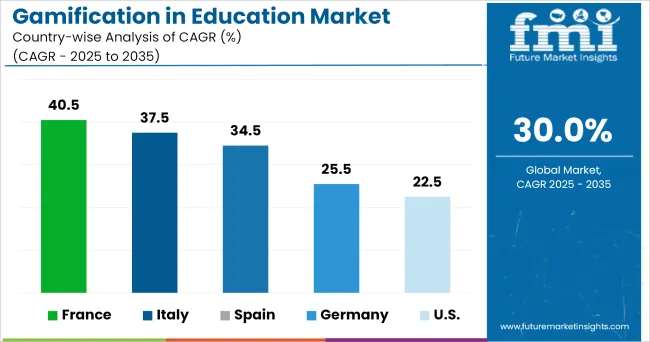
The entire education industry in the USA is growing extremely rapidly, and the predictions concerning market growth are encouragingly positive. The country have access to an entire spectrum of tech-through the smartphones, through their desktop computer, or other interactive devices. Due to the advanced digital literacy in the country, organizations are continuously adopting and deploying eLearning for their employees.
More than 60 percent high school students in the USA leverage only smartphones to search for study and training material. The increasing adoption of cloud-based authoring tools and learning platforms in USA, along with presence of existing technological infrastructures available in the country make it easier for organizations to leverage the tools and network speeds they have on hand to deliver eLearning modules.
There are currently around 1.367 billion people living in China today, of which only 100 million users are actually participating in eLearning opportunities. That means only eight percent of China’s population has access to and participates in eLearning. Still, with 700 million Internet users, the room for growth is huge.
Comparing the numbers for population versus eLearning participants identifies a gap which could be easily closed using prepackaged eLearning, better workforce training, and even the freedom for social networking as part of the learning process. Hence, Chinese government are focusing are investing more on eLearning solutions which would drive the market growth in coming years.
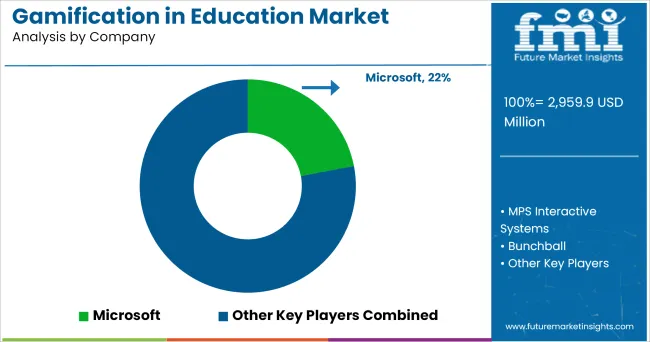
Some of the leading vendors offering gamification in education products include:
These vendors have adopted various key strategies, to increase their customer base locally and globally. The vendors are focusing on product innovation and strategic partnerships with the regional vendors to collaborate for offering advanced data connotation tools to effectively design AI/ML based models.
The report is a compilation of first-hand information, qualitative and quantitative assessment by industry analysts, inputs from industry experts and industry participants across the value chain. The report provides in-depth analysis of parent market trends, macro-economic indicators and governing factors along with market attractiveness as per segments.
The report also maps the qualitative impact of various market factors on market segments and geographies.
The global gamification in education market is estimated to be valued at USD 2,959.9 million in 2025.
The market size for the gamification in education market is projected to reach USD 40,805.4 million by 2035.
The gamification in education market is expected to grow at a 30.0% CAGR between 2025 and 2035.
The key product types in gamification in education market are gamification software, cloud-based, on-premises, services, professional services and managed services.
In terms of end user, k-12 segment to command 44.8% share in the gamification in education market in 2025.






Full Research Suite comprises of:
Market outlook & trends analysis
Interviews & case studies
Strategic recommendations
Vendor profiles & capabilities analysis
5-year forecasts
8 regions and 60+ country-level data splits
Market segment data splits
12 months of continuous data updates
DELIVERED AS:
PDF EXCEL ONLINE
Energy Efficiency Gamification Market Analysis by Type, Deployment, End User, and Region through 2035
Interactive Whiteboard Market Size and Share Forecast Outlook 2025 to 2035
Industrial Energy Management System Market Size and Share Forecast Outlook 2025 to 2035
Industrial Insulation Market Size and Share Forecast Outlook 2025 to 2035
Injection Blow Molding Machine Market Size and Share Forecast Outlook 2025 to 2035
Industrial Safety Gloves Market Size and Share Forecast Outlook 2025 to 2035
Industrial Cleaner Market Size and Share Forecast Outlook 2025 to 2035
Instruments for Peptide Drug Synthesis Market Size and Share Forecast Outlook 2025 to 2035
Industrial Dust Treatment System Market Size and Share Forecast Outlook 2025 to 2035
Injectable Osteoarthritis Microspheres Market Size and Share Forecast Outlook 2025 to 2035
Industrial Vertical Washing Tower Market Size and Share Forecast Outlook 2025 to 2035
Industrial Pepper Market Size and Share Forecast Outlook 2025 to 2035
Industrial Electronics Packaging Market Forecast and Outlook 2025 to 2035
India Decorative Veneer Industry Size and Share Forecast Outlook 2025 to 2035
Intermediate Bulk Container (IBC) Market Forecast and Outlook 2025 to 2035
Industrial Absorbent Market Forecast and Outlook 2025 to 2035
Industrial Furnace Industry Analysis in Europe Forecast and Outlook 2025 to 2035
Industrial Denox System Market Size and Share Forecast Outlook 2025 to 2035
India Outbound Tourism Market Size and Share Forecast Outlook 2025 to 2035
Infectious Disease Diagnostics Market Size and Share Forecast Outlook 2025 to 2035

Thank you!
You will receive an email from our Business Development Manager. Please be sure to check your SPAM/JUNK folder too.
Chat With
MaRIA